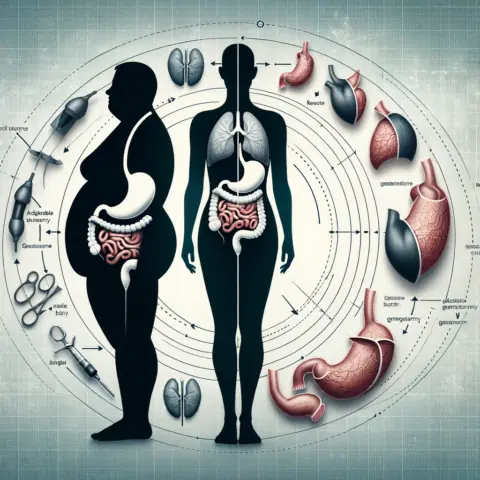Bariatric surgery has come a long way, embracing new technology, improving patient safety, and yielding better results than ever before. Today’s techniques are light-years ahead of where they started, and the pace of innovation shows no signs of slowing. This article explores the technological advancements that have taken place in bariatric surgery and what they mean for patients.
Transformation of Bariatric Procedures: From Invasive to Minimally Invasive
The first significant technological change in bariatric surgery has been the shift from open surgeries to minimally invasive procedures. Laparoscopic surgery was a game-changer in the field of bariatric surgery, minimizing scarring, reducing recovery time, and lowering the risk of complications. This advancement was made possible by the development of high-definition cameras and specialized surgical instruments that allowed surgeons to operate through small incisions, providing a clear view of the surgical area.
The introduction of robotic surgery took minimally invasive procedures to a new level. Robotic systems, like the Da Vinci Surgical System, provide a magnified, high-definition, 3D-view of the surgical area. Surgeons control the robot’s arms, which can rotate and bend with more flexibility than the human hand, allowing for increased precision and control.
Advanced Surgical Techniques: A Step-by-Step Walkthrough
One of the major innovations in bariatric surgery is the development of different surgical techniques. Among these, the Gastric Bypass and Gastric Sleeve surgeries stand out as two of the most effective methods of achieving long-term weight loss.
The Gastric Bypass procedure, once the gold standard of bariatric surgery, involves creating a small pouch from the stomach and connecting it directly to the small intestine. This dual-action technique not only limits the amount of food one can consume but also reduces the absorption of calories and nutrients, leading to significant weight loss.
On the other hand, the Gastric Sleeve surgery is a more recent development and has gained popularity due to its less complicated nature. This procedure involves removing a portion of the stomach to create a sleeve-like structure. It reduces stomach capacity, which curbs hunger and results in weight loss. Recent advancements have even allowed this procedure to be done using a single incision, making it even less invasive than traditional methods.
Enhanced Recovery Techniques: Minimizing Risks and Maximizing Results
A significant part of bariatric surgery’s advancement lies in improved recovery techniques. Today, surgeons and medical teams employ an Enhanced Recovery After Surgery (ERAS) protocol that helps patients recover faster and more comfortably.
ERAS protocols incorporate comprehensive, evidence-based strategies, from preoperative education and counseling to postoperative pain management and nutritional support. Innovations in this area have significantly improved patient experiences, reduced hospital stays, and minimized postoperative complications.
The Power of Digital Health: Aiding in Pre and Post Surgery Care
Digital health technologies have significantly transformed bariatric care by improving patient engagement, communication, and health outcomes. Online resources such as the Ultimate Guide to Weight Loss Surgery offer valuable information to potential patients considering surgery.
Meanwhile, mobile applications and wearable devices allow patients to track their nutritional intake, physical activity, and weight loss progress in real time. These digital tools can offer patients personalized advice, reminders, and motivation, playing a crucial role in maintaining long-term weight loss.
Telemedicine, another rapidly growing field, allows for remote patient monitoring and virtual consultations, which has proven particularly useful in the postoperative phase. It offers convenience and accessibility, particularly for patients residing in rural or distant areas.
These advancements are a testament to how far bariatric surgery has come. From new surgical techniques to advanced recovery protocols and digital health tools, technology has transformed the field and will continue to do so. The result is a more effective, safer, and patient-friendly approach to weight loss surgery. Stay tuned as we delve deeper into each of these advancements in the following sections.
Robotics in Bariatric Surgery: Precision, Safety, and Improved Outcomes
In the spirit of advancing surgical precision and safety, robotic assistance has emerged as a revolutionary technology in the field of bariatric surgery. It offers an elevated level of dexterity and control, which is paramount for the intricate maneuvers involved in weight loss surgeries.
Robotic systems like the da Vinci Surgical System have been incorporated into various bariatric procedures, including gastric bypass and sleeve gastrectomy. A comparison of sleeve gastrectomy vs robotic surgery elucidates the inherent advantages of the latter, such as enhanced vision, stability, and precision.
In this process, the surgeon operates from a console equipped with controls that direct the robotic arms. A high-definition 3D camera provides a magnified view of the surgical site, ensuring precision during operation. This has been especially beneficial for gastric bypass, a complex procedure that requires meticulous suturing and tissue manipulation.
However, robotic technology is not limited to conventional procedures. It has also paved the way for the development of less invasive surgical alternatives. One of these is the Lap-Band surgery, which involves placing an adjustable band around the upper part of the stomach. This procedure is done laparoscopically, thereby reducing postoperative pain, hospital stay, and recovery time.
“The emergence of robotic surgery has been a game changer, especially for patients who are considered high-risk. Its use has allowed us to perform complex procedures with utmost safety and precision.”
The concept of robotically assisted surgeries might sound futuristic, but it is already making its mark in the present. As technology continues to evolve, it is foreseeable that this will become the standard of care in bariatric surgery.
Telemedicine and Digital Health Platforms
Alongside advancements in the operating room, technology has also revolutionized patient care outside the hospital setting. With the advent of telemedicine and digital health platforms, patients now have the ability to connect with their healthcare providers from the comfort of their homes.
These platforms provide a means for virtual consultations, reducing the need for patients to travel for appointments. They also facilitate continuous monitoring and feedback, helping patients stay on track with their post-operative recovery and lifestyle modifications. This is particularly crucial in the context of bariatric surgery, where long-term weight management is a key determinant of success.
Our comprehensive guide on how to navigate the gastric bypass journey covers how telemedicine has become an integral part of preoperative preparation and postoperative follow-up.
Additionally, digital platforms serve as a conduit for patient education, allowing individuals to have access to resources like nutrition and diet tips for post gastric sleeve surgery and ways to overcome emotional eating after gastric sleeve surgery.
Moreover, these platforms can also foster a sense of community among patients. Support groups, for instance, can be hosted online, giving patients an opportunity to share their experiences and learn from each other. Such community support is essential in maintaining motivation and adherence to lifestyle changes, as detailed in our guide on finding support and community for your journey.
The proliferation of digital health platforms is a testament to how technology has transformed the way we deliver healthcare. By breaking geographical and logistical barriers, it has made quality healthcare more accessible and patient-centered.
Artificial Intelligence and Predictive Analytics
In the age of big data, artificial intelligence (AI) and machine learning algorithms have been increasingly utilized to glean insights from vast amounts of patient data. In the context of bariatric surgery, these tools can be used to predict patient outcomes, help with decision-making, and enhance patient care.
For instance, predictive analytics can help identify patients who are at a higher risk of complications post-surgery. By analyzing a multitude of factors such as the patient’s age, BMI, comorbidities, and other relevant health indicators, these models can give surgeons a clearer picture of the patient’s risk profile. This information can guide the surgical team in tailoring perioperative care plans, deciding on the most suitable surgical technique, and potentially reducing complications.
Similarly, AI can be used to forecast long-term outcomes and success rates after bariatric surgery. This can be instrumental in setting realistic expectations for patients, guiding post-operative care, and optimizing long-term weight management. It also helps healthcare providers to better allocate resources, making healthcare delivery more efficient and cost-effective.
Notably, AI has a promising role in enhancing the precision and safety of robotically assisted bariatric surgery. By integrating AI with robotics, we may be able to develop automated systems that can perform certain steps of the surgery independently or assist the surgeon in real-time. For example, AI could potentially help in detecting anatomical landmarks, ensuring accurate tissue manipulation and reducing the risk of errors.
However, while AI and predictive analytics have immense potential, it’s also crucial to acknowledge the challenges. Issues related to data privacy, ethical considerations, and the need for high-quality, unbiased data are significant and require thoughtful solutions.
Wearable Technology and Patient Monitoring
The rise of wearable technology has also been a boon for patient monitoring and management in the field of bariatric surgery. Devices such as smartwatches, fitness trackers, and health apps can collect valuable data about a patient’s physical activity, calorie intake, sleep patterns, and even stress levels. This can provide healthcare providers with insights into a patient’s daily habits and lifestyle, enabling personalized advice and interventions.
For patients, these wearables offer a convenient way to monitor their progress, stay motivated, and maintain lifestyle changes necessary for long-term success post-bariatric surgery. Studies have shown that self-monitoring can lead to better weight loss outcomes, emphasizing the importance of these technologies.
From devices that remind patients to hydrate or move after surgery, to apps that provide nutritional guidance and help track progress, wearable technology is becoming an essential tool in the bariatric patient’s journey. As technology continues to evolve, these devices are expected to become even more sophisticated, offering holistic and real-time patient monitoring.
In conclusion, it is evident that technology is reshaping the field of bariatric surgery at an extraordinary pace. From robotic surgeries to telemedicine, predictive analytics, and wearable tech, these advancements are not only improving patient outcomes but also revolutionizing the entire healthcare delivery model. As we move forward, it’s critical to continue investing in these technologies and adapting to these innovations to provide the best care possible for patients undergoing bariatric surgery.
Key Takeaways
- Robotics and Telemedicine:
- Robotic-assisted surgery has increased precision, reduced complication rates, and improved recovery times in bariatric surgery.
- Telemedicine has allowed for better patient monitoring, flexible consultations, and improved access to care, especially in rural and remote areas.
- Artificial Intelligence and Predictive Analytics:
- AI and machine learning can predict patient outcomes, guide decision-making, and enhance patient care in bariatric surgery.
- They help identify high-risk patients, forecast long-term outcomes, and optimize resources.
- AI could potentially enhance robotic surgery by automating certain steps or assisting surgeons in real-time.
- Challenges include data privacy, ethical considerations, and the need for high-quality, unbiased data.
- Wearable Technology and Patient Monitoring:
- Wearable tech like smartwatches, fitness trackers, and health apps collect valuable data on patient’s lifestyle, enabling personalized advice.
- They help patients monitor their progress, maintain lifestyle changes, and improve weight loss outcomes.
- Technology is expected to evolve further, offering holistic and real-time patient monitoring.
- In conclusion, technology is revolutionizing bariatric surgery and healthcare delivery, leading to improved patient outcomes. Continual investment and adaptation to these innovations are vital.







